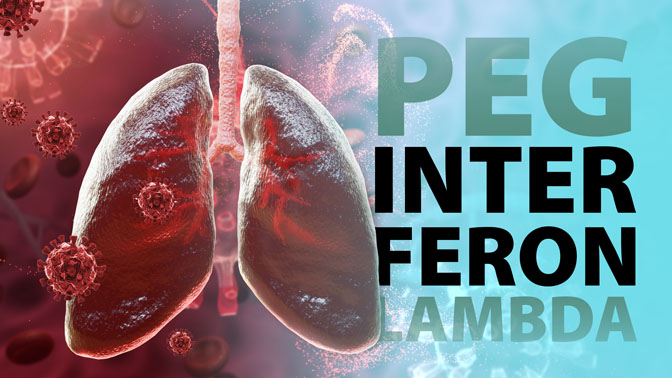
Scientists at the Toronto General Hospital Research Institute (TGHRI) have found that a new drug therapy—based on a protein known as interferon—can promote viral clearance in outpatients with COVID-19.
As of March 2021, over 874,000 Canadians have contracted COVID-19—the disease caused by the severe acute respiratory syndrome coronavirus 2 (SARS-CoV-2).
While many clinical trials have focused on finding ways to reduce the severity of COVID-19 in hospitalized individuals, few trials have identified treatments that can be used outside the hospital setting. To expand drug treatment options, TGHRI Senior Scientist Dr. Jordan Feld led a phase II clinical trial involving patients with mild to moderate COVID-19 symptoms.
“Treating outpatients is important,” says Dr. Feld, “If we can quickly lower viral levels in these patients, they are less likely to develop severe disease and, perhaps more importantly, have a lower risk of infecting others.”
The research team tested a form of interferon—a protein involved in the body’s defence against viruses—known as peginterferon lambda. This protein is a modified interferon that stimulates the body’s natural immune response.
Dr. Feld and other researchers have studied peginterferon lambda as a treatment for viral hepatitis, which led the team to explore the use of the drug to treat COVID-19.
The trial included 60 adults recently diagnosed with COVID-19. The researchers randomly assigned 30 patients to receive peginterferon lambda and the other 30 to receive a placebo. They found that a single injection of peginterferon lambda rapidly reduced the amount of SARS-CoV-2 detected in nasal swabs. By seven days after treatment, viral levels were over 260-fold lower in patients treated with peginterferon lambda than patients treated with placebo. In comparison, recently approved antibody treatments resulted in only about 3-fold reductions in viral levels.
“Accounting for the amount of virus detected at the start of the trial, patients who received peginterferon lambda were over four times more likely to clear the virus within a week than patients who received the placebo,” explains Dr. Feld. Of the patients who started the trial with high viral levels, 79% cleared the virus with treatment, compared to only 38% with placebo.
The researchers also found that peginterferon lambda was safe and well tolerated. Side effects were similar between patients who received the drug and those who received the placebo.
Unlike some COVID-19 treatments, the activity of peginterferon lambda does not depend on the genetic makeup of the virus. This is especially important with the recent spread of new virus variants from the UK and South Africa, which appear to be more infectious.
The team is now testing peginterferon lambda in hospitalized COVID-19 patients and hopes to soon run a phase III clinical trial to test the drug in a larger outpatient population.
“We know that peginterferon lambda promotes viral clearance. Now, we need to investigate whether this translates into clinical benefits,” says Dr. Feld. “Even with the vaccine coming, we need therapies now. If early antiviral treatment lowers a patient’s risk for developing serious disease or for spreading the virus, it could help turn the tide on this pandemic.”
This work was supported by the Toronto COVID-19 Action Initiative, the University of Toronto, the Ontario First COVID-19 Rapid Research Fund and the Toronto General & Western Hospital Foundation.
Feld JJ, Kandel C, Biondi MJ, Kozak RA, Zahoor MA, Lemieux C, Borgia SM, Boggild AK, Powis J, McCready J, Tan DHS, Chan T, Coburn B, Kumar D, Humar A, Chan A, O’Neil B, Noureldin S, Booth J, Hong R, Smookler D, Aleyadeh W, Patel A, Barber B, Casey J, Hiebert R, Mistry H, Choong I, Hislop C, Santer DM. Tyrrell DL, Glenn JS, Gehring AJ, Janssen HLA, Hansen BE. Peginterferon Lambda for the Treatment of COVID-19 in Outpatients: A Phase 2, Placebo-Controlled Randomized Trial. Lancet Respir Med. 2021 Feb 5. doi: 10.1016/S2213-2600(20)30566-X.

The senior author of the study, Dr. Jordan Feld, is a Senior Scientist specializing in liver disease at the Toronto General Hospital Research Institute.




